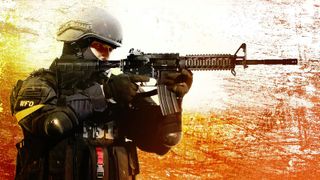Improve your gamesense in Counter-Strike: Global Offensive

In CS:GO there are a few things that separate the good players from the bad: aim, economic knowledge, movement and last but not least, gamesense. Counter-Strike—like many other competitive games—requires equal parts technical skill and intelligence. Gamesense is a direct extension of the latter. Before you can start popping heads on the regular you need to know where those heads are and what they’re carrying.
What is gamesense?
Gamesense is really just a another word for instinct. It’s the knowledge of how your game is progressing and how your teammates and your opponents are playing. Gamesense allows you to make a judgement about where your opponents are on the map and what kind of gear they’re carrying. If your gamesense is good enough, you’ll have a much easier time getting into bombsites, clutching rounds and countering flanking maneuvers. Gamesense is a combination of economic knowledge and map knowledge, so in order to improve your gamesense you’ll need to learn more about both those things.
Don’t worry about losing a couple games while you learn
Economic knowledge
Economic knowledge is easy to develop. Try to remember what your opponents were carrying after every round and keep an eye on the win/loss chart on the scoreboard. If your opponents just lost two rounds where they were carrying full loadouts, it’s safe to assume they’ll buy pistols this round. Did you just drop a few rounds? Then look out for AWPs because your opponents are flush with cash and ready to roll. The best way to get a feel for how the CS:GO economy works is by looking through your own demos and seeing how your opponents tend to spend their money. When you reach a higher rank you’ll notice that your opponents and your teammates follow the unwritten economy rules a lot more closely, increasing the accuracy with which you can estimate your opponent’s gear.
Map knowledge
Map knowledge is a little harder to develop due to the sheer number of maps you have to study. Another reason why map knowledge isn’t learned as quickly as economic knowledge is the fact that you have to learn two different sides of a map equally well. Take the time to go through the learning process map for map and don’t worry about losing a couple games while you learn. Take it from StarCraft veteran WhiteRa: more GG, more skill.
Pre-aiming is the art of aiming at locations where you expect opponents to be playing from before you’ve actually seen them, allowing you to shoot them immediately instead of having to snap your crosshair onto them.
Watch and learn
I’ve mentioned watching demos a few times as a way to improve your gamesense. There’s a good reason why I believe demos are such an invaluable part of refining this part of your skillset. It’s impossible to give you one way to improve your gamesense that will work for every player at every rank. Playstyles simply differ too much to write one guide that covers all the bases. If you’ve ever seen a high-ranked player fail horribly at smurfing on the lower ranks, you’ll know what I’m talking about. High-ranked players expect their opponents to adopt a playstyle they know how to counter because nearly everyone on their rank is playing that style. When those players then play against people of a lower rank, it takes them time to get used to their opponents not defending bombsites from the optimal positions, making it hard to pre-aim when attempting an entry.
This knowledge, combined with your newfound economic understanding, grants you special clairvoyant powers
The only truly reliable way to get a real understanding of how people at your rank are playing is by watching your own demos. Who better to show you how your opponents play than your opponents?
If this is your first time attempting to improve by watching your demos, here’s some advice. You’ll want to start by finding a demo of a close game. You’re not going to learn anything from watching a game where you were on fire the entire time, dropping 50 frags and getting knife kills every other round. You’ll also have a hard time finding flaws in your game when your opponents were much better than you and you lost without winning a single round. A game where you barely lost is great for learning purposes. You were matched against a team of nearly equal skill and were just unable to pull out the victory. Watching the replay will let you understand why.
The biggest gaming news, reviews and hardware deals
Keep up to date with the most important stories and the best deals, as picked by the PC Gamer team.
As terrorists
Let’s start off by looking at your terrorist side. Compare your buying choices on the pistol round with our pistol guide and then look at the angles your opponents were holding. If you spot a position you’ve never seen before, make a note of it and move on. You’re going to want to do this for a few demos in order to find out which spots are common and thus should be checked when attempting to storm a bombsite.
Those one-off spots your opponents sometimes choose to play are a lot less important than whichever locations are more popular at your rank. Repeat this process for every standard round and you’ll end up with a pretty good idea of how counter-terrorists defend their bombsites at the level that you’re playing. You’ll also notice that playstyles heavily depend on loadouts, so keep track of what players are carrying too. This knowledge, combined with your newfound economic understanding, grants you special clairvoyant powers (or, at the very least, a better chance of winning.)
As counter-terrorists
We want to focus on getting a good feel for where the terrorists are moving on the map and what that means for your defence. Once again we turn to our demos. While watching your CT-side, two things are important: how your opponents attempt to take bombsites and how they defend bombsites afterwards. Note-keeping is the solution to figuring out which types of attacks are most common and require special attention. Keep an eye out for how your opponents are moving before they start an attack so you can call it out to your team before the assault even happens. Being able to do this will make you invaluable to any team you come across in matchmaking. When your team does lose a bombsite, you are forced into the most difficult position in the game: retaking. Look at your demos for common spots the terrorists like to use in order to defend their explosives and check those first when attempting to retake a bombsite.
A single demo doesn’t tell you much, so take the time to watch a few of your own demos and make it a habit as you rank up. When you notice your ability to predict your opponents’ playstyle slipping, look at your demos and note the differences. Keep doing this and you’ll start adjusting your playstyle without even thinking about it, making you a much better player in the process.

PC Gamer Pro is dedicated to esports and competitive gaming. Check back every day for exciting, fun and informative articles about League of Legends, Dota 2, Hearthstone, CS:GO and more. GL HF!
Most Popular


